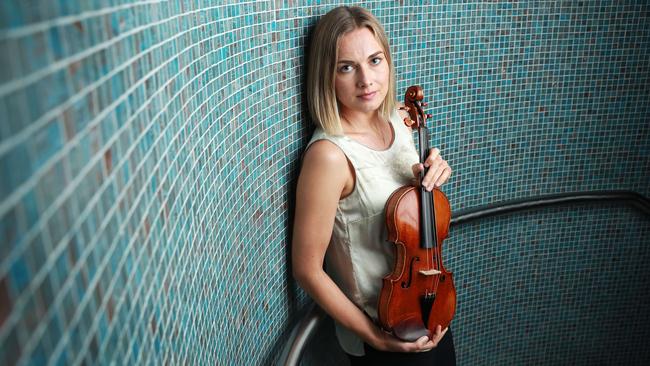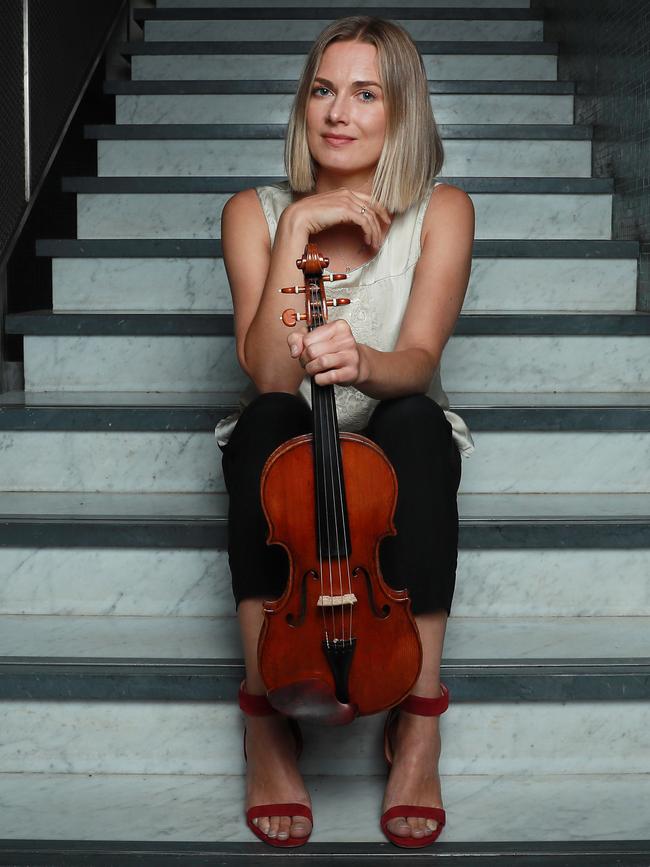Australian Chamber Orchestra principal violin Satu Vanska and her ‘priceless’ Stradivarius
The lead violin of the Australian Chamber Orchestra, Satu Vanska, 40, shares her thoughts on life and her ‘priceless’ Stradivarius.

Australian Chamber Orchestra principal violin Satu Vanska, 40, was born in Japan to Finnish parents. She surfs, plays a “priceless” Stradivarius, and forgets to make Valentine’s Day plans with husband Richard Tognetti, who is ACO artistic director and lead violinist.
-
Q.What sound or noise do you love?
A. I love the sound of Tibetan singing bowls. I like the sound of the sea. Sounds are a bit like smell, aren’t they? They take you to a place. Where I live it’s the same birds singing. They sound very different to the birds in London. I like the sounds that transport you to a place.
Q. Do you have particular sounds that, say, transport you to Finland or Japan?
A. In Finland the sound of silence, pretty much (laughs). It’s a very quiet place, the sound of people shushing, often in Finland you have restaurants that have no music at all. In Japan the insect sounds are different. It’s the sounds that all the machines make all the time, the talking machines, they talk to you and there’s a lot of that electronic noise in the background. You hear a lot of laughter in Australia, people being quite uninhibited in the way they express themselves.
Q. What are you listening to at the moment?
A. I love the voice of Jim Morrison. I listen to a lot of The Doors, actually. Because I do like Jim Morrison’s sexy voice, but also the band as a whole. I've been listening to a lot of music by an American minimalist composer called Morton Feldman. I’ve really enjoyed listening to the podcast Dolly Parton’s America and I’ve actually started re-listening to a little bit of Dolly, she’s pretty amazing. I love her. I had no idea … I had an inkling that she’s really complex and I knew that she’s written so many songs. But she’s a force of nature, she’s really quite something.

Q. Do you remember any Lutheran hymns? I understand your parents were Lutheran ministers.
A. Of course. One of the most important ones is by (Hans Leo) Hussler, which JS Bach used a lot, called O Sacred Head, Now Wounded. It’s a beautiful hymn. I think a lot of Anglicans sing it too.
Q. What was the last piece of music that you listened to that made you feel emotionally overwhelmed, and can you articulate why?
A. It could have been probably something like at my father’s funeral, a hymn playing that triggered something like that. I always go back to, somehow, religion. Hearing hymns, the humbleness of it all and Lutheran hymns make me very emotional in general, you know, they just trigger that place ... Music is a language. You don’t know why it makes you feel it that way but that’s the idea of music. As they say, talking about music is like dancing about architecture. When words stop, music fills in that space that words can’t.
Q. In 2007 violinist Joshua Bell busked at a train station in Washington DC. What do you think would happen if you changed your performance space from the City Recital Hall to Wynyard railway station?
A. No one would notice that it’s us/me. It would be just somebody busking on the train station. Sure the busker would sound pretty good. Having said that, in Europe there’s really excellent buskers, really amazing gypsy bands. Didn’t Sting do it, too? Or Paul McCartney in London? The thing is, if you’re there you are just a busker. People wouldn’t actually believe that, “Wow it’s Josh Bell, is it Sting? Is it Paul McCartney? Really?!” But it’s the context. Could earn a couple quick bucks, I suppose.
Q. How do you find balance between all the time you spend playing and practising violin with the other things you enjoy, like surfing?
A. It’s really important to have other things that you enjoy — surfing for my husband as you know, for Richard, for him there’s no life without surfing. It’s great to have a thing like surfing which is so all encompassing. You’ve got nature, you’ve got, you know, elements. It’s not something that you just buy a ticket to and have your instant gratification. It’s very similar to music in that sense. A lot of stuff that I love doing is something that you try to balance, to help the way how you can feel on stage so you feel fresh performing. Sometimes it is getting dumped by a big wave that makes you feel really fresh, you know, because it doesn't feel like such a big deal then.
Q. How do you think your Finnish and Japanese background has shaped your current interests?
A. So I was born in Japan on the smallest main island that has really good surf. When I moved to Australia one of my first friends I made and the person that I learned to surf with was Derek Hynd, who’s amazing and a legendary character. We became really good friends. It turns out he’d surfed Shikoku. He was actually there surfing at a time when I was there as a child. There’s this funny combination, getting to know Japanese surfers and the way they respect Derek Hynd, adore him and then show the sort of very Japanese-style hierarchical respect towards him. I had never met another Finnish surfer until just a few months ago. I was in Indonesia and there were four, no five, Finnish people in the water one morning. I said, “This is impossible. I mean, this is just so random. I’ve never even met anybody else from Finland who surfs.” I think Finland and Japan always needed Australia into the mix and it makes a perfect circle now.
Q. Looking back on all the time you dedicated to music, what advice would you give to your 16-year-old self?
A. Get over your frustrations, things happen slowly, you just keep at it. And before you know you’ve actually become really good and you think that you’re not, but you actually are. You don’t even realise it yourself. Nothing that’s really good happens suddenly, all the good things in life are a result of hard work. And be kind to yourself and be kind to other people too.
To watch Satu Vanska talk about her Stradivarius violin and play Bach go to theaustralian.com.au/review
READ MORE: Backstage at Elton John’s last hurrah | What’s on the culture calendar this March

To join the conversation, please log in. Don't have an account? Register
Join the conversation, you are commenting as Logout